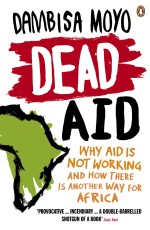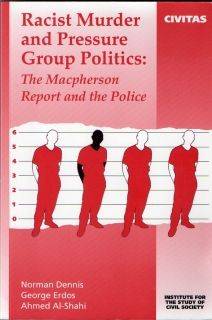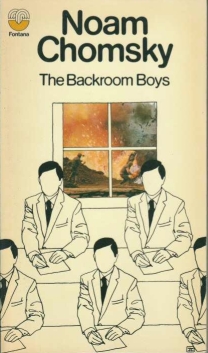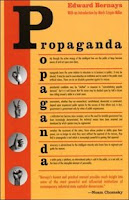This review is from: Dead Aid: Why aid is not working and how there is another way for Africa by Dambisa Mboyo
Removed from Amazon.com and Amazon.co.uk
A token black who ignores herds of African elephants in the rooms, 28 Nov 2010
By Rerevisionist

A rather strange book. The writing style is pitiful—copied from the USA Jewish junk propaganda press, of the Time/Life sort. Staccato assertions and cliches ('palpable excitement', 'mounting evidence', 'latched on to', 'China is motoring', 'california-based interface', 'core focus of policy agenda', 'the Dutch Disease', with utterly irrelevant space-wasting 'human interest' anecdotes presumably as relief. All counter-evidence is censored or, possibly, simply not known or noticed. Large parts read like Goldman Sachs information to big investors - you can imagine Bill Gates or Spielberg being sent the stuff in bulk. For example, sparing the acronyms, in some African counties 'performance across the bond markets is impressive'. The numerical detail falters where ordinary Africans are concerned, though: the 'Myth of Aid' chapter talks of an 'African revival' which means there's been 1. A commodity prices 'surge', 2. 'Positive policy dividends' apparently meaning 'transparent and stable monetary performance' and 3. Some notable strides 'democratic elections and decline in perceived corruption'. It's typical of the book that all these things are unquantified, probably (I'd guess) because the commodities surge benefits only people nominally on company boards. Moyo is interested in performance of bond markets, and masses of people supposedly living on less than a dollar a day are ignored.
It's extraordinary that about thirty people are credited with contributing to and tuning up this book. They're even named!
A quick google shows she's been promoted by all the US media, a certain sign of Obama-style puppetry. It's worth debunking her qualifications: her parents presumably were the first wave of 'educated' blacks - her father supposedly spent eight years in the USA studying linguistics (although he couldn't speak his wife's language). Her mother studied English ditto. Moyo did four years at Oxford: Britan now has a huge debt, has been largely de-industrialised, and has been the victim of vast frauds, mostly of course Jewish, and is in the undemocratic EU, which is tottering. None of the Oxford 'thinkers' have any grasp on these issues. Oxford is also the home of the ridiculous phoney Evans, who retails WW2 propaganda. She also worked at Goldman Sachs, though what she did, if anything, is never stated. This doesn't prove she's no good, of course, but it's not encouraging. I have to say this because of the cocoon of publicity, which includes an unctuous introduction by Niall Ferguson, who is a sort of professional anti-white Rothschild apologist.
It's disappointing, though unsurprising, to find a total lack of any grasp of the possibilities of Africa. No doubt Africa needs appropriate technology, of which there is no sign. It's possible its geography needs reconsideration - many of the states seem hard to defend, for example, and after all they were only invented with lines on maps. There's the depressing possibility, undiscussed by Moyo, that Africans have such low IQs that nothing can be done. Africa has had more wars than many places on earth, and yet Moyo has no examination of spending on arms and who profited. There is nothing on money stashed abroad by some of the great dictators. Is it impossible to appropriate it? - No comment from the banking 'expert'. There's nothing on the actual mechanism: one imagines each of these countries has its Rothschild bank, printing money at huge interest, backed by nothing much, and there's a sort of credit entry, and of course a debit interest entry building up. Moyo gives no information on state banks or private banks which actually do the lending. (Incidentally, it's no surprise she has no idea about 'AIDS' - she's one of these people who spell 'healthcare' as one word).
There are notionally two parts to this book; one showing that aid doesn't work, the other showing what should be done. Neither part begins to address the issues.
I've quoted from the 'Myth of aid' chapter, but won't bother with the others. One would expect detail of how 'aid' has been damaging - figures of guesses for where it's gone, and details of what Moyo calls inevitably the 'fine print' - for example, in effect it's a gift to be paid for by buying the 'donor' country equipment. I wouldn't be surprised if all the power stations are supplied by different countries, at dfifferent voltages and fuels, for example. I'd be even less surprised to find the donors take a share, and black officals take another share. But there's no actual detail as to why it doesn't work - a truly incredible, tabloid style evasion, in contrast with the rates of return and balanced portfolio investment claims.
The second part is supposed to deal with what might be done; a lot relates to China, although close examination suggests China contributes only 15% to the influx of 'money'. Also FDI ('foreign direct investment', presumably a euphemism for investment not done through Goldman-Sachs). It's curious that Moyo says nothing about the South African model: after prolonged propaganda against apartheid, by the usual; media suspects, a joke system has been introduced, with all the mines under the same control as before. Worth a mention? Not to Moyo! She also mentions the problem of agricultural subsidies, both in the USA and the EU. The net effects are obscure - I'd guess deliberately, as it can't be conceptually that difficult to visualise. Anyway, she dislikes them, and supports free markets, which she thinks were the basis of development. Maybe her Oxford tutors hadn't heard of Empire Preference, the Zollverein, US tariff walls - but I suppose nobody's perfect. Another section looks at microfinance, something which Goldman-Sachs and the like obviously would avoid. It all sounds a bit like Friendly Societies and Building Societies in Britain. An example is the Grameen Bank in I think just Muslim countries north of India. Hard to judge, as Moyo seems unable to describe them accurately, and doesn't seem to know about Islamic dodges to pretend there's no interest, and there are accusations that they resemble Ponzi schemes. She also mentions remittances - she wants 1/4 of the income of come countries to come from remittances. (It is of course Jewish policy to flood African immigrants into Europe). There's a tantasling comment about savings squirreled away; maybe Goldman-Sachs have a memory of squeezing out gold from starving Russians in the 1930s, in the 'valuta' shops.
Let me try to summarise, first, what is OMITTED. There is NOTHING SYSTEMATIC WHATEVER on ---
[1] What does 'living on less than $1 a day' actually mean?
[2] What is actually done with 'aid'?
[3] What is the mechanism of 'donations' or 'aid' to these countries?
[4] How much damage was done to Africa deliberately by wars?
[5] Capital projects - e.g. new airport in India, space research - are paid for by e.g. the British taxpayer. Why?
[6] How much 'aid' goes nto the pockets of donor country officials, perhaps to build bolt-hole homes abroad?
[7] How much money from copper, oil, coffee, whatever actually goes to the inhabitants of the countries?
[8] Are there Fed / Bank of England style Rotshchild banks ripng off these countries?
[9] Is it deliberate policy to keep Africans desperate so they will invade Europe?
[10] How damaging are African superstitions such as Islam, Muti etc?
[11] Has anyone got any plans at all for developing Africa in a sane way?
[12] Is some sort of political union possible? The population of Africa is approaching that of China and there's no sign of it slowing. Why have dozens of countries?
[13] What does the 'World Bank', clearly an important 'aid' thing, actually do?
Now let me try to summarise HER SUGGESTIONS. I say 'try to' because of course they are coded and vague:-
[1] She wants a phone call 'scenario' - All African leaders should make a phone call saying aid will be turned off in (say) five years.
[2] 'Strengthening of institutions' she thinks is 'easy to implement' with just a phone call!
[3] Things can't get worse! She thinks the people on less than $1 a day won't be much harmed. I don't know - I can imagine Africa with all wild life eaten, all trees used for fuel, with cannibalism rife. But why worry.
Let me try to illustrate the insanity of this. Mr Mboto on the phone: "Hello, Mr Treasurer. I am the Prime Minister of Xland. As you know, I have a huge bureaucracy of my friends and my tribe, and we run our country, even if some of them find the work a little hard to do properly. I'm grateful for the 100 million in my bank, by the way. We have an army and airforce and national airline and our radio and TV. We have quite an expensive police system. As you know, you have our copper mine and palm oil plantations. Now we are going to cut off money from you, so that none of my tribe can be paid, and our wonderful armed forces will be unequipped, and our strongarm police will not be paid. That nice educated woman Moyo says it's easy to implement new institutions, so we will make one phone call and we will then have an educated civil service, proper entrepreneurial facilities, good hospitals, an exemplary legal system and a well educated workfoirce, with of course well-thought out plans to research and make use of local resources to supply the needed water, food and energy to our people."
This is clearly nuts. So what does the book actually mean? What's the subtext? I can only guess, but maybe something on these lines: [1] The Rothschild bank system must be kept, however much of a parasitical effect it may have on Africans. [2] All benefits to ordinary Africans should be offloaded onto white taxpayers, and anything profitable taken by investors. [3] The huge frauds recently carried out - mostly by the usual suspects - must be protected. [4] For cult racist reasons, blacks must be put into European countries as much as possible. [5] It's possible China does not have an arms supplier mentality, unlike other 'donors'. Maybe this is giving them an edge, which the others worry about. [6] There must be more!
I don't think Moyo's book is of any value. I'd personally be grateful if people on Amazon who recommend alternatives could give detailed reviews of the books they're recommending! Thank you! I'd like to have a better idea of what's going on!








